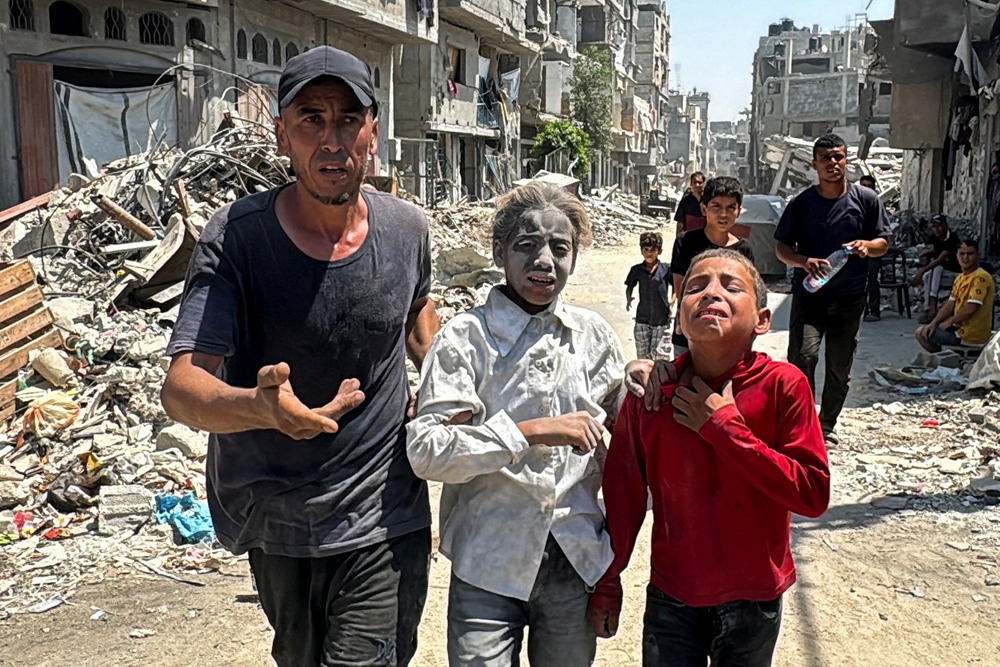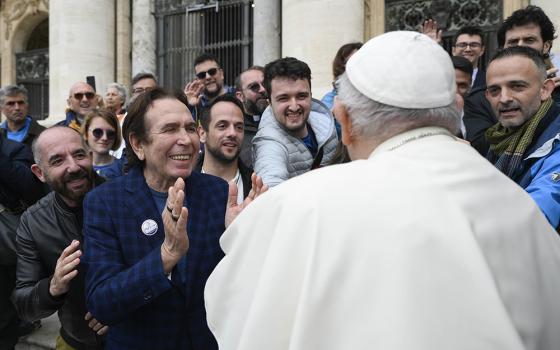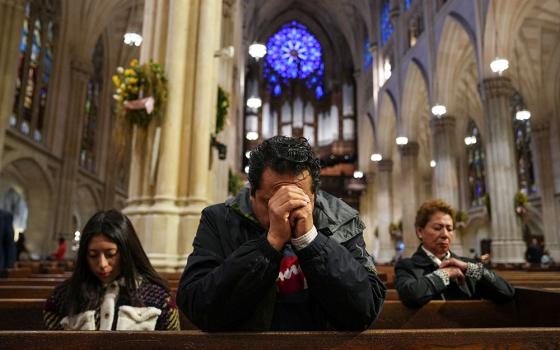
Palestinians react at the site of an Israeli airstrike that destroyed several houses, amid Israel-Hamas conflict, in Khan Younis in the southern Gaza Strip Aug. 27, 2024. (OSV News/Mohammed Salem, Reuters)
With the approaching one-year mark of the Israel-Hamas war in the Gaza Strip, spurred by the Hamas attack on southern Israeli agricultural communities Oct. 7, the Patriarchs and Heads of the Churches in Jerusalem urged the warring sides to "reach a rapid agreement" for a cease-fire.
In an Aug. 26 statement, they said the cease-fire should be "resulting in the end of the war, the release of all captives, the return of the displaced, the treatment of the sick and wounded, the relief of those who hunger and thirst, and the rebuilding of all public and private civilian structures that have been destroyed."
They called for an "end to the pursuit of death and destruction," adding they "feel compelled to once again express our grave concerns over its dire direction. For despite repeated calls for the de-escalation of violence from ourselves and the international community, the situation in our beloved Holy Land has only continued to deteriorate."
According to the Gaza Ministry of Health, which does not distinguish between civilian and combatant fatalities, over 40,000 Palestinians have been killed by Israel in the war since Oct. 7.
Hamas killed 1,200 people, including soldiers, in their early morning onslaught and took more than 250 people hostage.
With the Aug. 27 rescue of Qaid Farhan Alkadi, 52, a Bedouin Israeli citizen and father of 11, 108 hostages now remain in Gaza, according to the Hostages Families Forum statement, including 36 thought to be dead.
"Kaid's return home is nothing short of miraculous," the forum said.
Meanwhile, at least nine Palestinians have been killed in a major operation by Israeli forces in the north of the occupied West Bank, the Palestinian health ministry said.
Israeli security forces said they had begun "a counterterrorism operation" in Jenin and Tulkarm overnight and that they had so far killed "five armed terrorists from the air and ground," according to the BBC.
The patriarchs emphasized that "millions of refugees remain displaced, their homes inaccessible, destroyed, or beyond repair" and that "hundreds of innocents are weekly killed or severely wounded by indiscriminate attacks." They underlined that "countless others continue to endure hunger, thirst, and infectious disease. Among these are those languishing in captivity on all sides, who additionally face the risk of ill-treatment from their captors."
Advertisement
Repeated delays in the negotiations along with other "provocative acts" have only served to "heighten tensions," they said, a day after an Israeli pre-emptive airstrike thwarted a Hezbollah missile attack in the north of the country meant to have been in reprisal for Israel's killing its military commander Fuad Shukr in an airstrike in Beirut in July.
"We stand at the precipice of a full-blown regional war," they warned, urging leaders of the region and the international community to begin diplomatic discussions.
They expressed their special concern for the Christian communities under their pastoral charge including those taking refuge in Gaza at St. Porphyrios Orthodox Church and Holy Family Catholic Church, as well as the staff of al-Ahli Anglican hospital and the patients under their care.
"We pledge to them our continued prayers and support both now and at the conclusion of the war, when we will labor together to rebuild and strengthen the Christian presence in Gaza, as well as throughout the Holy Land," the church leaders said.
The statement concluded by calling on Christians and people of goodwill around the world to pray and promote "a vision of life and peace throughout our war-torn region, recalling Christ's words: 'Blessed are the peacemakers, for they will be called children of God.'"






